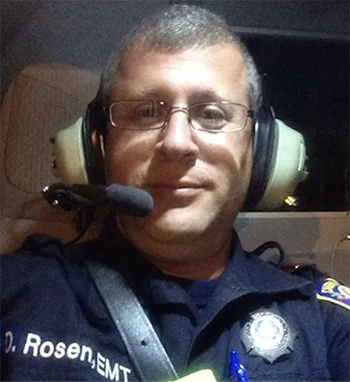 |
| Bob Brody |
In 2011, David Rosen took a ride in the back of an ambulance speeding toward a hospital, siren wailing. But rather than getting medical attention, he was giving it. The former pharmaceutical industry executive had recently become an emergency medical technician (EMT).
My friend had long earned a six-figure salary as a communications specialist for PR agencies and drug firms. Now, at 40 years old, as a part-time EMT, David was pulling down merely $9.75 an hour, without benefits. People routinely switch from one profession to another in mid-career. But rarely does anyone opt to shift from a white-collar position to a blue-collar one.
So why?
He thrived for 17 years doing healthcare public relations for a living, starting right after college, first on the agency side at GTFH and then at Burson-Marsteller. We met as colleagues at Ogilvy Public Relations Worldwide, where we both had private offices in a midtown Manhattan skyscraper and helped handle million-dollar accounts.
In the process, David learned about medical conditions such as diabetes, depression and HIV, and how to educate consumers and physicians about the medications available for treating and managing those illnesses. He devoted his days to brainstorming marketing strategies with colleagues in corporate boardrooms and delivering PowerPoint presentations pitching C-suite clients. He wore suits and traveled worldwide. He went on to land a communications role at Dupont Pharmaceuticals, then at Bristol Myers Squibb.
 |
| David Rosen |
Then, in December, 2008, he got laid off, the job he loved suddenly taken out from under him, leaving him feeling shocked, lost and worthless. He could have parlayed his experience as a senior vice president into another role in the same field. But ever since his teens he’d wanted to be an EMT – odd, given that he could never stand the sight of blood.
So instead he decided to take advantage of the opportunity, finally, to study in pursuit of the dream he had set aside. Soon he received state certification as a New Jersey EMT and joined the Berlin, New Jersey EMS Squad and Cherry Hill Fire Department.
And for the next six years, wearing a fire department badge, heavy-duty work boots and “tactical pants” with numerous pockets holding trauma shears, tape and gloves, he dedicated most of his waking hours to responding to 911 calls in the suburban towns of Cherry Hill and Berlin. As EMTs do, he assessed a patient’s condition, documented what happened, determined treatment needed. He provided first aid and life support if and as needed, then delivered the person to the emergency department and gave the staff there a detailed report.
David pulled 12-hour overnight shifts starting at 8 in the evening and sometimes lasting as long as 18 hours. Then he repeated the cycle the next night before getting two nights off. Lost sleep emerged as an occupational hazard.
“One second you’re trying to catch a quick nap in a recliner, the next you’re racing along in your truck,” David recently told me. “Your heart rate suddenly soars. It’s like zooming from zero to 100 miles an hour in almost no time at all. That’s the life.”
Out on the front lines, he sees suffering and death. The little boy who fell from the playground slide and broke his arm. The woman in a car accident who had to be delicately extricated from behind the wheel to avoid worsening her injured back. The man who took his dog for a walk, only for his heart suddenly to stop and needed to get it started again. It’s still healthcare, what David does, still a life-and-death proposition, just literally hands-on.
“The person we pick up in our ambulance is having the worst day of his or her life,” he says. “They need medical attention, often desperately. My job is to do an initial assessment, secure any additional resources necessary and then treat and transport them to the hospital as quickly and safely as possible.”
Eventually personal financial pressures forced David to return to the office and a full-time job. Median pay for full-time EMTs and paramedics in 2021 was $36,930 a year, compared to $62,800 for public relations specialists. His wife, Deborah, had to support the family of four they have two daughters, Allison and Jessica). Paying the mortgage on their house and maintaining a comfortable standard of living, even as he worked overtime, turned into a struggle. “If I could have supported my family as I want to just doing EMS,” he says, “I would have.”
But even though David no longer requires income from a second job -- he's now managing director of media at Argot Partners, a strategic communications firm focused on the life sciences -- he never stopped serving as an EMT.Monday through Friday, he’s there at his desk, in front of a computer, managing clients, deadlines and deliverables. But come Friday night, David Rosen moonlights away. He heads out the door at 8 p.m. to log a 12-hour shift, straight through to 8 a.m. on Saturday. He does this month after month, year in and year out. He always looks forward to getting home, but also to making sure others get home, too.
***
Bob Brody is a PR consultant and veteran of Weber Shandwick, Ogilvy and Rubenstein. He is also the author of Playing Catch with Strangers: A Family Guy (Reluctantly) Comes Of Age and an essayist who contributes to the Wall Street Journal, the New York Times and the Washington Post.


 Southern governors claim they know what's best for their working class, and it's not pay raises... A Ukrainian human rights group played a key role in convincing House Speaker Mike Johnson to hold a vote to send arms to Ukraine, Israel and Taiwan... Trump Media & Technology Group blames short-selling and not lousy outlook for its stock slump.
Southern governors claim they know what's best for their working class, and it's not pay raises... A Ukrainian human rights group played a key role in convincing House Speaker Mike Johnson to hold a vote to send arms to Ukraine, Israel and Taiwan... Trump Media & Technology Group blames short-selling and not lousy outlook for its stock slump. The techniques deployed by OJ Simpson's defense team in the 'trial of the century' served as a harbinger for those used by Donald Trump... People worry about the politicization of medical science just as much as they fret about another pandemic, according to Edelman Trust Barometer... Book bans aren't restricted to red states as deep blue Illinois, Connecticut and Maryland challenged at least 100 titles in 2023.
The techniques deployed by OJ Simpson's defense team in the 'trial of the century' served as a harbinger for those used by Donald Trump... People worry about the politicization of medical science just as much as they fret about another pandemic, according to Edelman Trust Barometer... Book bans aren't restricted to red states as deep blue Illinois, Connecticut and Maryland challenged at least 100 titles in 2023. The NBA, which promotes legalized gambling 24/7, seems more than hypocritical for banning player for placing bets... Diocese of Brooklyn promises to issue press release the next time one of its priests is charged with sexual abuse... Truth Social aspires to be one of Donald Trump's iconic American brands, just like Trump University or Trump Steaks or Trump Ice Cubes.
The NBA, which promotes legalized gambling 24/7, seems more than hypocritical for banning player for placing bets... Diocese of Brooklyn promises to issue press release the next time one of its priests is charged with sexual abuse... Truth Social aspires to be one of Donald Trump's iconic American brands, just like Trump University or Trump Steaks or Trump Ice Cubes. Publicis Groupe CEO Arthur Sadoun puts competition on notice... Macy's throws in the towel as it appoints two directors nominated by its unwanted suitor... The Profile in Wimpery Award goes to the Ford Presidential Foundation for stiffing American hero and former Wyoming Congresswoman Liz Cheney.
Publicis Groupe CEO Arthur Sadoun puts competition on notice... Macy's throws in the towel as it appoints two directors nominated by its unwanted suitor... The Profile in Wimpery Award goes to the Ford Presidential Foundation for stiffing American hero and former Wyoming Congresswoman Liz Cheney. JPMorgan Chase chief Jamie Dimon's "letter to shareholders" is a must-read for PR people and others interested in fixing America and living up to its potential... Get ready for the PPE shortage when the next pandemic hits... Nixing Netanyahu. Gaza carnage turns US opinion against Israel's prime minister.
JPMorgan Chase chief Jamie Dimon's "letter to shareholders" is a must-read for PR people and others interested in fixing America and living up to its potential... Get ready for the PPE shortage when the next pandemic hits... Nixing Netanyahu. Gaza carnage turns US opinion against Israel's prime minister.


 Have a comment? Send it to
Have a comment? Send it to 
No comments have been submitted for this story yet.